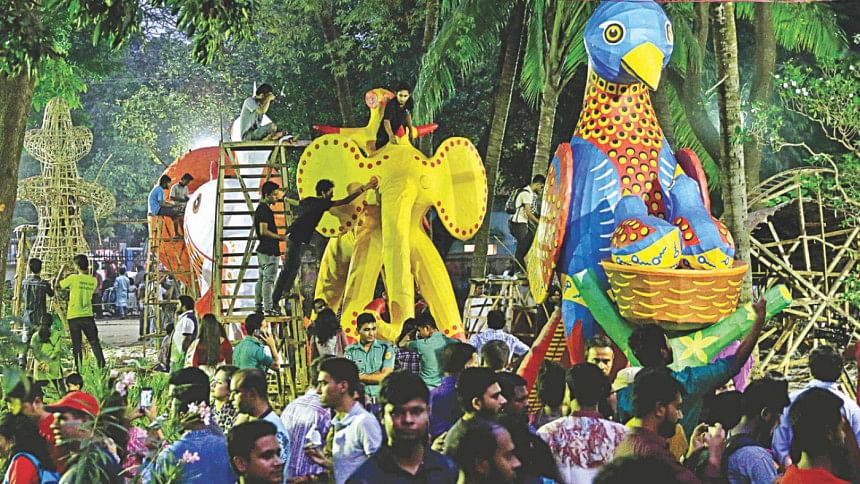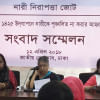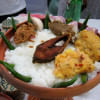Baishakhi smile

Our car has to take a detour from Dhanmondi Road 27 because of traffic congestion in front of Genetic Plaza, the new hub for getting glass bangles -- one of the must wearable accessories for women on Pahela Baishakh. The boy who was collecting fares in the Leguna in front of our car showed huge acrobatic skills to aim at a hanging green mango from his moving vehicle, and the fruit yielded to the will of this young conductor. A huge grin spliced his face as he collected the Baishakhi delicacy while rushing back to his post. The smile of the boy, who was hardly 10, made me smile, and I saw all the passengers were also smiling with him. This is the true joy of Baishakh that we celebrate.
Baishakh is tantalisingly swinging before us like a green mango which was just the other day a yellow bud to match Fagun. As the year is ending, you need to take an aim at this swinging delicacy of nature to make it yours. If you don't, maybe the Nor'wester will do it for you. After all, this is the time when nature conspires to make you happy in its process of renewal. This for me is the essential Baishakh, which is not plastic like the cardboard owls or tigers dangling on shopping mall's entrances or the pixel based SMS's promising happiness through indulged consumerism.
The beginning of the New Year with a smile is all that matters: some may find joy in a clay pot of rural food enriched by the presence of fried Hilsa; some may find the smile by loitering aimlessly in the streets while seeing and being seen; some may find the smile in participating in the grand gala where the extraordinary artists are performing for the ordinary; some may find joy in becoming a cultural tourist or going native for a day; some may find joy in milking money while others may find comfort in buying future memory; some may find the smile by immersing in an illusory national identity while embracing many imported mannerisms and rituals.
Baishakh, or rather its celebration, has evolved over the years. The strategic readjustment of the calendar by the Mughal Emperor Akbar to ensure revenue collection that is in sync with the harvesting pattern has gone a long way to becoming a cultural icon. The seeds of Chhayanat's resistance against the encroachment of Urdu became the banyan tree of Ramna of all our cultural shelter. The educated middle class, who were at the forefront of forging a national consciousness, came mostly from the University of Dhaka. They have been the symbolic Nor'westers that usher in changes. They have been there to administer the emergence of Bangladesh, the reemergence of democracy. They are the proverbial fluttering flag of the new like a Kaalbaishakhi storm. Baishakh is a seasonal juncture when nature and man work in unison. The sound of protest that is looming large shows that there is a brewing tension over a practice that needs revision and renewal. Yes the sky looks grim as the bellowing storm darkens the horizon when a particular class feels that they are being deprived of their chance of bringing change to their lot. Baishakh will bring in the monsoon and wash away some traditional thoughts, and offer us the new. After all, one of the teachings of Baishakh is that you cannot cling onto something just because it is established or practiced for a long time. Each system demands renewal, and renewal brings smile. I wish you all a genuine smile on Pahela Baishakh.
(The writer is Professor of English (on leave), University of Dhaka. Currently he is the Head of the Department of English and Humanities at ULAB)

 For all latest news, follow The Daily Star's Google News channel.
For all latest news, follow The Daily Star's Google News channel. 








Comments